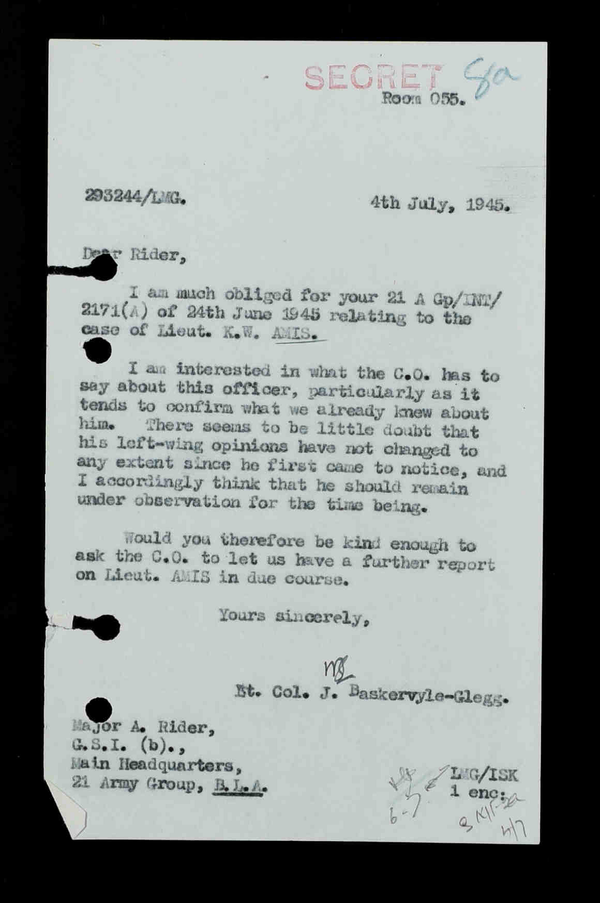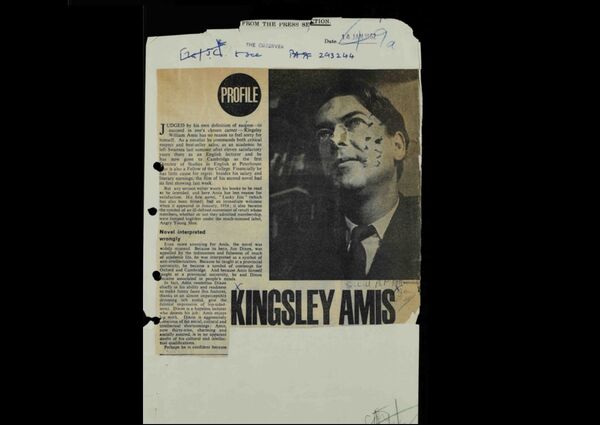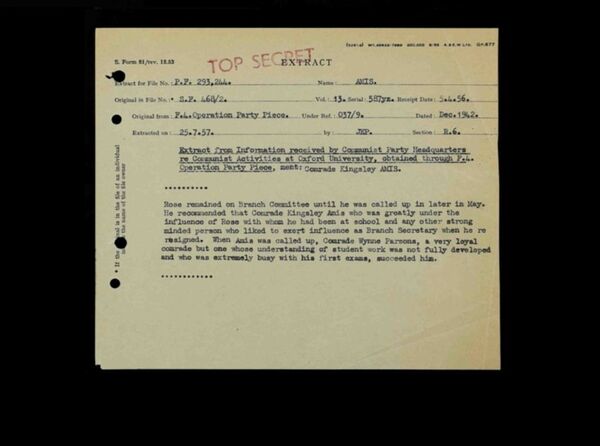The dominant figure of post-war British writing, a pioneer of the "angry young men" literary movement, Kingsley Amis has seen his share of fact and fiction about his private life. But the just released MI5 file shows him in a new light — one of the greatest British writers since 1945 was under surveillance because of his brief romp with communism when he was a student at Oxford before WWII.
The file opens in April 1942 with an intercepted letter from Val Walker, a communist activist in Cambridge to Ernie Keeling, a Communist organizer in Oxford. In the letter, according to the Security Service, "Amis is reported as being a very promising new member of the Oxford branch of the Communist Party…"
When Amis was called up for military service during the war, MI5 requested his Personal Papers from the Royal Corp of Signals where he served.
The extract from the Army papers offered fairly innocuous assessments of Amis by the Dean of St. John's College, Oxford:
"A pleasant man, though a little lacking in vigour. His work is good; he is industrious and obtained distinction in one examination. He is very interested in politics and perhaps has devoted too much time to them."
and his commanding officer:
"…very keen and cheerful and possesses a mind of his own".
Apparently that was not what MI5 was expecting, so half a year later, in May 1945 they returned to the subject:
"This officer came to notice in 1942 as a student at Oxford University when he was reported to be a very promising new member of the Oxford branch of the Communist Party. Since being in the Army… he is known to have been in touch with the Headquarters of the Daily Worker and it is therefore reasonable to suppose that his political views have not changed in any way."
Amis' "crime" was that he was regularly receiving a newspaper, duly registered in Britain.
Controversial Statements
MI5 requested an up-to-date report from the commanding officer, whose assessment was more relevant to Amis' personal traits than to his political views. The officer did not find Amis "a particularly inspiring personality".
"In discussions he has always tended to take extremist views towards most aspects of life and gives the impression of trying to compensate for his rather nebulous personality by making extreme and controversial statements in the hope that it will create an impression."
Compare this to a much later verdict on Amis as a writer by his biographer Zachary Leader: "the desire to irritate and annoy animated Amis all his life".
His commanding officer concluded that even if Amis tried to show an extremist tendency in his work or in his associations with his colleagues, "few people would take him seriously".
When Amis demobilized in 1945 and the Army could no longer provide reports on him, MI5 switched to local police. Chief Constables were alerted to Amis coming to settle in their area, and reported back to the Security Service on his whereabouts.
A handwritten note on file requested police in Berkhamsted, where Amis moved to and where his parents lived, to take over the "observation". Chief Constable reported that the suspect had already left his patch but while in his "custody" showed "no evidence of Communistic activities…Stated to have been hotheaded in the Forces but to have 'quietened down' following demobilization."
Under Observation
Amis did not seem to pose a slightest threat to national security. However, his Army boss was adamant that "his left wing opinions have not changed to any extent since he first came to notice, and I accordingly think that he should remain under observation for the time being".

This "time being" lasted well into the sixties, even after the Americans gave Amis clearance to come and lecture at Princeton University in 1958-59 with the "Reds under the beds" frenzy of McCarthyism not fully over.
The US visa business caused some panic on the British side. It transpired that it had been granted "due to mistaken action by an inexperienced Consular official", who had missed the reference to Amis' Communist past. His American trip was up in the air.
MI5 were worried about possible repercussions for the Service:
"Should it be finally decided that Amis is not after all to be granted a visa, he is very likely indeed to make a public protest….Although his protest could logically only be directed against the US authorities, and could not involve this Service or its sources directly, I was sure that [name redacted — NG] would agree with me that neither of us wanted any public protest if it could be avoided."
The alarm was false. The Americans appeared to be satisfied by the statement Amis made in the Daily Worker in February 1957 that he "had had Marxism — in both senses of the words. I have experienced the ailment and so am immune. And I have also utterly rejected it."
MI5, not entirely sure if this statement was good enough to let Amis off the hook, decided to "take shelter behind that if necessary."
Opportunity for Subversion
Despite Amis' clearance for work in the USA the Foreign Office kept sending vetting enquiries to MI5 each time Amis was to travel abroad.
This led MI5 to issue a note to the British Council in May 1966:
"Amis has been the subject of similar enquiries from you and of reports from us dated 4th May, 1955 and 26th August 1957. We have nothing to add to the reports mentioned above, and the information contained in them does not in the view of the Security Service provide grounds for denying the candidate employment in a post offering opportunity for subversive activity."
So, in MI5's view, discussing British literary scene with foreign audiences created an opportunity for subversion! Subversion of whom — of the foreign audiences?
There were yet more vetting enquiries — in January 1961, when the British Council was considering sending Amis alongside other British lecturers to a British Literary seminar in Indi; and in April 1961, when Amis was penciled in for a literary tour of Yugoslavia and Italy, arranged by the British Council.
MI5 was meticulously collecting newspaper cuttings about Amis that could give them a clue as to his true political beliefs.

Unlucky Jim
After an astounding success of his first novel "Lucky Jim" published in 1954 Amis became hot property on the literary lecture circuit. The British Council wanted to send him to Cologne in Germany to represent the new wave of British literary talent — and duly asked MI5 if they had anything on him.
The reply was elusive: while Amis was "reliably reported to be a keen and promising new member of the Communist Party at his University in 1942… Amis has not come to adverse notice since 1944, and in 1949 we received a report on him indicating that he did not appear to indulge in any Communist activities at least in the locality of his home".
The German section of the British Council decided to be on the safe side and "not to call on Amis as a lecturer for a few years yet."
But they could not stop him from going to Portugal on a three-month trip to broaden his horizons, as was the condition of the Somerset Maugham prize he received for his first novel in 1954.
A vetting enquiry, however, was duly made.
In his reply the Chief Constable of Swansea (Wales) where Amis lectured at the local University noted that Amis "has not previously come to notice in this County Borough as a person of security interest."
Amis departure for Portugal did not spare him from MI5's prying eyes. A request was sent to British officials in the country "to let us know should he come to your notice while he is in Portugal."
Police in Swansea where Amis lived and worked for six years described his political outlook as "that of a socialist with a strong leaning towards the extreme left wing."
Sounds more like Old Labour than a Red-bloodied Communist. But did this distinction make any difference? Spying on the legally established left-of-center political parties was a matter of course for MI5. In his book A Matter of Trust Nigel West says that F Branch of the Security Service had moles in most leftist organizations. [F Branch was responsible for counter-subversion until 1988]

By the time that it publicly declared that 'communist subversion' was no longer a key target for its activities, wrote John Green in the "British Communists: The Untold Story", MI5 had accumulated a quarter of a million files on the Communist Party of Great Britain. Its membership was never near this mark. How many of those files were based on fiction rather than fact, as the file on Kingsley Amis shows?



